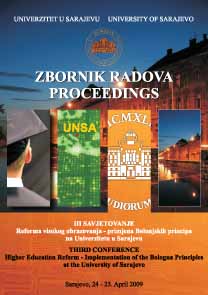Specifičnosti biomedicinske edukacije u vrijeme predstojeće integracije Univerziteta u Sarajevu i aktuelnih zakona o visokom obrazovanju
Specific Qualities of Biomedical Education in Time of the Upcoming Integration of the Sarajevo University and Current Laws on Higher Education
Author(s): Nedžad Mulabegović, Emina Nakaš-Ićindić, Damir Aganović, Almira Hadžović-Džuvo, Bakir Mehić, Semra Čavaljuga, Senija Rašić, Meliha Lekić, Maida Rakanović-TodićSubject(s): Social Sciences
Published by: Univerzitet u Sarajevu
Keywords: medicine; health; education; research work; teachers; continuing medical education
Summary/Abstract: Sarajevo University’s Faculty of Medicine covers the areas of: education, scientific research, provision of treatment and healthcare at the highest level, and medical care in the community. Specific qualities of biomedical education are reflected in: - integrated, six-year cycle study, - integration of basic biomedical and clinical disciplines with subordination of classes/education of basic biomedical disciplines in relation to their current or future application in medical practice, - patient-oriented educational process as an unroundabout factor which hides in itself – carries the state of illness which is the object of education in the sense of establishing the diagnosis, determining the treatment and establishing the system of prevention, - complicated and demanding system of education which asks for more than 25 hours of work by one ECTS point. In other European countries that is 28 – 30 hours. The specific qualities of scientific research are reflected in: - the conviction that students’ professional and scientific research represents the constituent part of medical education, so that direct students’ inclusion in the professional and science research work represents a very important constituent part of educational program seen in encouraging of he development of critical judgement and creativity in students, habit of independent education and aspiring to the additional knowledge and establishing research skills. In relation to that, the extensive and many-sided international cooperation is necessary, as well as the promotion of European cooperation in providing quality. The necessity of providing teaching staff is reflected in: - the fact that in the aim is to provide the staff in accordance with the health market demands. The primary need and specific characteristics of medical education is the necessity for stronger bonding with the system of health and its institutions. Education is certainly necessary and the society expects a lot, especially the external factors - stakeholders, helath ministries (of the primary interest for the medical faculties) at cantonal and federal level, especially keeping in mind the fact that 80 per cent of the medical faculty graduates are employed at the budget institutions that belong to those ministries. About 60 per cent of the Medical Faculty’s teaching staff is employed at the healthcare institutions (clinical and healthcare centers, etc.). Their primary activities are not realted to teaching, but to providing health care. In that sense, they sign only part-time agreements with the Faculty.
Journal: Zbornik radova - Univerzitet u Sarajevu
- Issue Year: 2009
- Issue No: 03
- Page Range: 195-204
- Page Count: 10
- Language: Bosnian

